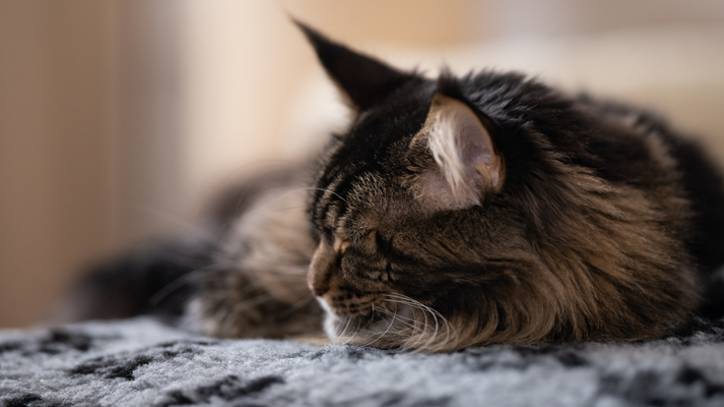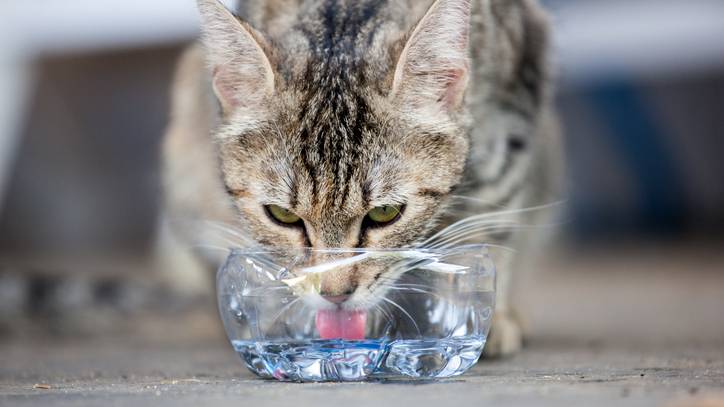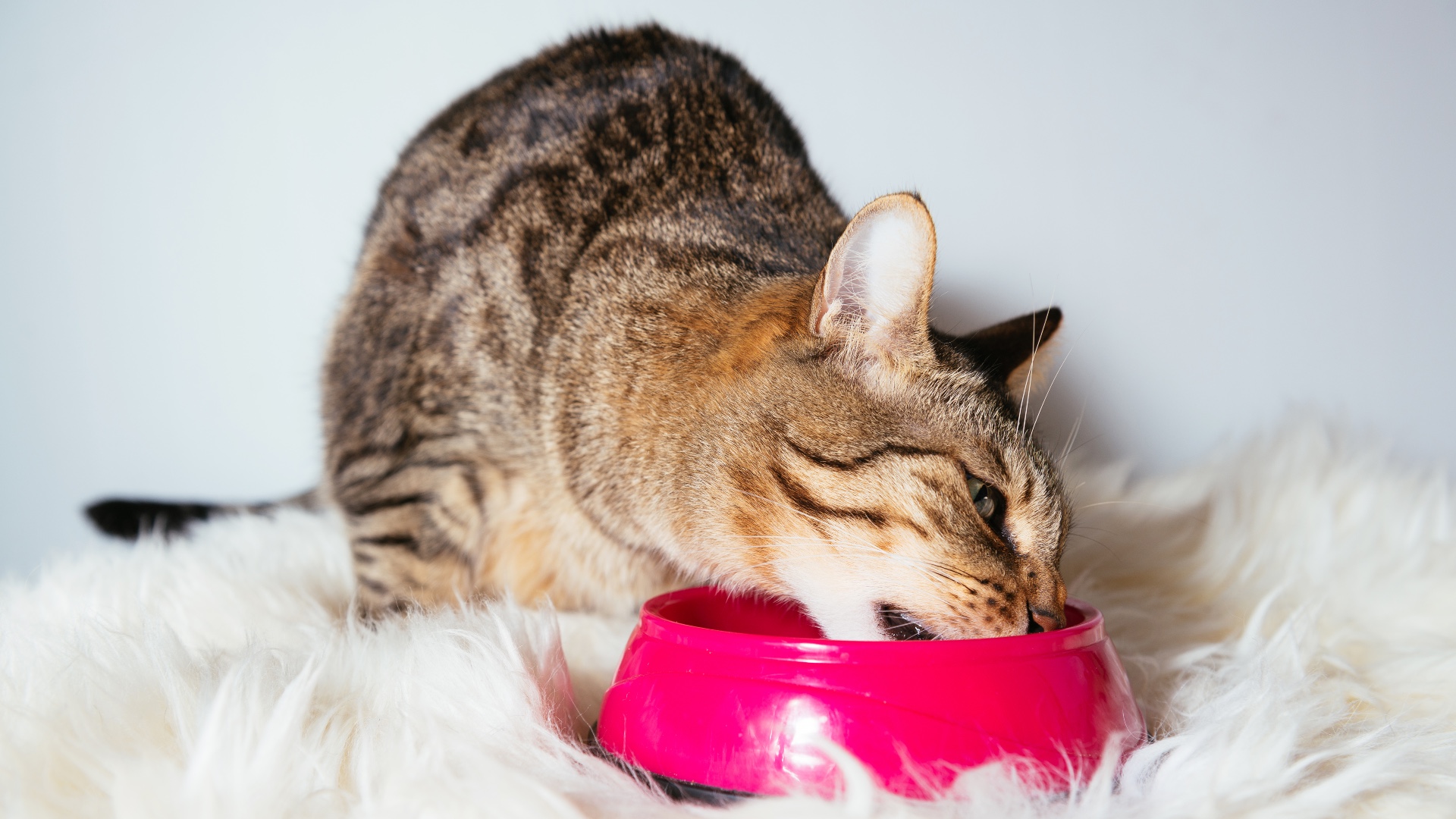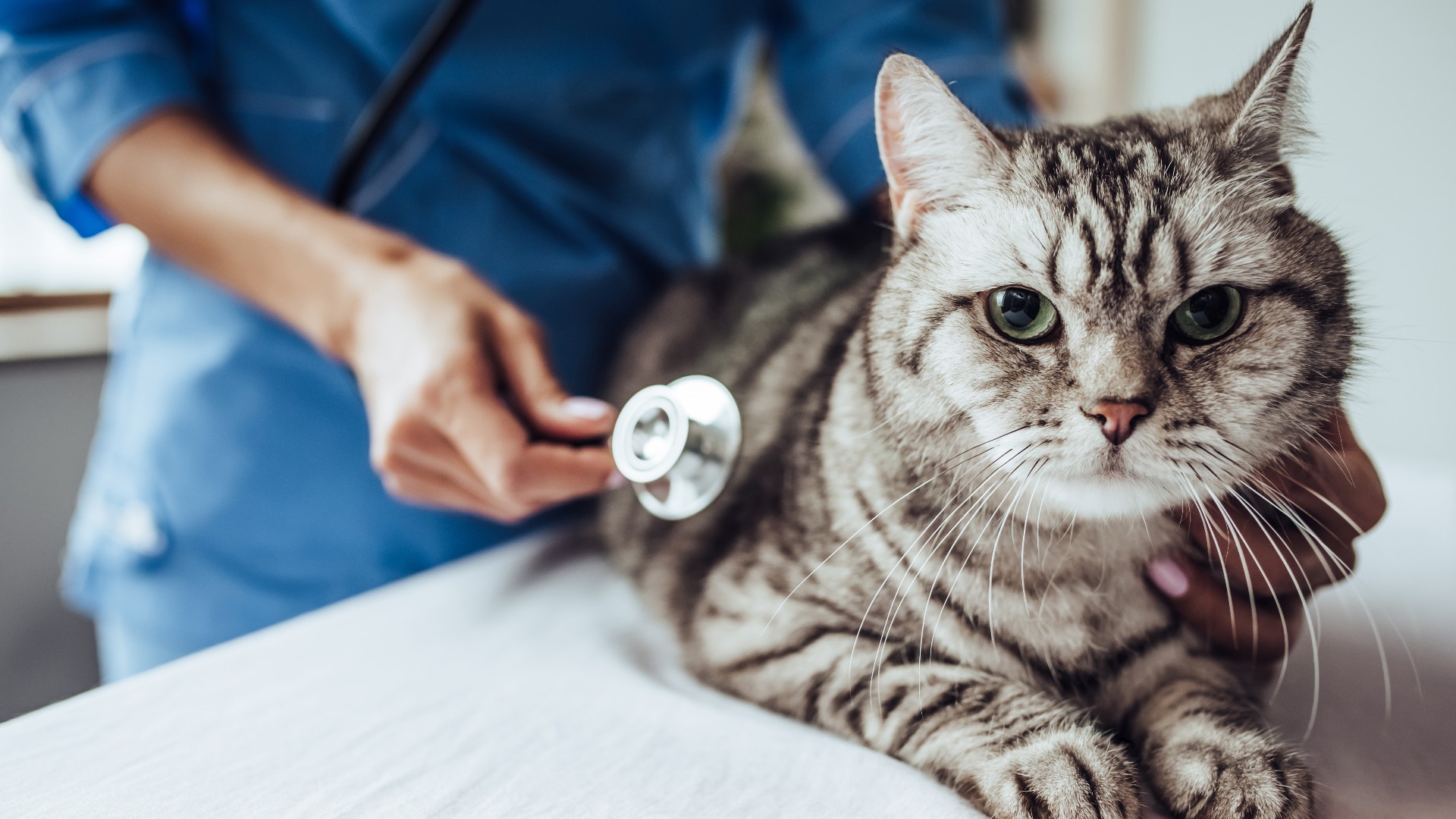Pancreatitis in cats: Vet's guide to signs and treatment
Are you curious about pancreatitis in cats? Let’s find out more about this painful condition

You might be aware of pancreatitis in humans or dogs, but what about pancreatitis in cats?
Pancreatitis can make cats poorly and it’s painful, but the early symptoms are sometimes vague. Therefore, if you think your cat is unwell, it's essential to get them checked over by a veterinarian so that treatment can be started early.
So, what symptoms should you look out for that might mean your cat has pancreatitis? What causes pancreatitis in cats? And what can you or your veterinarian do to treat it? Keep reading to find out.
- Acid reflux in cats
- Upset stomach in cats: Vet's guide to causes and treatment
- Stomatitis in cats: Vet’s guide to symptoms and treatment
What is pancreatitis in cats?
The pancreas gland is within the abdomen, near the stomach. One of its functions is to release digestive enzymes called lipase and amylase into the duodenum (first part of the small intestine) to help digest fats and carbohydrates.
As well as aiding digestion, the pancreas produces insulin which regulates blood sugar. If your cat has pancreatitis, it means that the pancreas is inflamed.
When the pancreas is inflamed, the digestive enzymes are overproduced and leak out of the gland, causing more inflammation in the surrounding area. Cats are prone to a condition called triaditis, where the inflammation isn't just related to the pancreas gland itself but also affects the liver and small intestine.
Signs of pancreatitis in cats
Pancreatitis in cats sounds really painful, doesn't it? And it's certainly a painful condition in humans too. So, you might expect that your cat would show extreme symptoms.
However, because cats are stoic and don't always show their pain outwardly, the signs can be more subtle than you might think.
If your cat has pancreatitis, you might notice them acting lethargic or hiding away. This could signify that they are in pain and don't want to move around much.
If they're particularly sore, they might sit in a hunched position with their legs tucked under them. It’s common for cats with pancreatitis to eat less or stop eating altogether, which could lead to some weight loss.
Often, cats with pancreatitis will also vomit, which can cause dehydration, especially if they’re not drinking much. Some cats with pancreatitis deteriorate quite acutely. However, some will develop more chronic pancreatitis.
If their pancreas is inflamed for a long time, it can affect its ability to produce insulin, leading to symptoms of diabetes. These symptoms include weight loss, your cat drinking a lot of water, and peeing more.

Causes of pancreatitis in cats
So, why would your cat develop this condition out of the blue? What triggers pancreatitis in cats?
Sadly, the illness is poorly understood, but there are a few theories, including trauma to the gland, a tumor, or an infection. In dogs, a high-fat diet or one-off snack can trigger a bout of pancreatitis, and this may also be the case with cats, although it’s not confirmed.
What about stress? Cats can develop other health conditions due to stress, including urinary tract disease and dermatitis, so can stress cause pancreatitis in cats? Although it's unlikely that stress would cause an initial bout of pancreatitis if your cat has chronic pancreatitis or is prone to flare-ups, stress could worsen it.
Treating pancreatitis in cats
Once your veterinarian has diagnosed your cat with pancreatitis, they will need to provide supportive care.
Sadly, there is no particular treatment for pancreatitis. Still, some medications can help your cat feel better and aid their recovery. These medications are usually pain relief, anti-sickness medications, and sometimes antibiotics. If your cat isn’t eating or if they are dehydrated, they might also need to go on a fluid drip.
So, what about how to treat pancreatitis in cats at home? It's important to realize that if your cat has pancreatitis, you need medication from a veterinarian.
The condition is excruciating, and your poorly puss will need veterinary care. However, you should provide good nursing care at home alongside veterinary treatment. This includes tempting your cat to eat, regularly offering water, and giving your feline friend somewhere calm and comfy to relax and recover.
If you’re wondering what is the best cat food for cats with pancreatitis, it's best to stick to a bland diet if they’ll eat it. White fish or boiled chicken are good options. Suppose your cat's not interested in eating, though. In that case, you might need to speak to your veterinarian about recovery diets and rehydration solutions.
Should you force-feed a cat with pancreatitis?
It's crucial not to force-feed your cat if they have pancreatitis. Cats can develop food aversion and negative associations with food very quickly.
Therefore, forcing them to eat, even if it's something tasty, could cause them to associate eating with symptoms like nausea or pain. This can become a vicious cycle where they become less and less keen to eat even though their symptoms are improving.

Can pancreatitis cause kidney failure in cats?
Most cases of pancreatitis in cats do not lead to kidney failure. However, if the inflammatory reaction within the body is serious enough, it can lead to multi-organ failure. Equally, sometimes severe dehydration can also cause acute kidney failure.
Life expectancy of cats with pancreatitis
You’re probably wondering can a cat recover from severe pancreatitis and how long it takes for a cat to get over pancreatitis.
The answer is yes; many cats recover from pancreatitis after supportive care. However, recovery time is variable, and progress can sometimes be slow. Sadly, it’s not uncommon for cats with chronic pancreatitis to have symptoms grumbling on and waxing and waning for months.
More acute cases tend to be more serious, but if they recover, it tends to be quicker, over a week or two. Unfortunately, after one bout of pancreatitis, the condition often recurs.
When to euthanize a cat with pancreatitis
Whenever you’re faced with that tough, heart-wrenching decision of whether it's best to euthanize, you should consider three things: Is your cat in pain? How is their mobility? And are they eating?
These three questions will help give you an idea of their quality of life. If your cat is struggling in more than one area and shows no significant improvement on a course of treatment, it might be time to discuss euthanasia with your veterinarian.

How to prevent pancreatitis in cats
Because the cause of pancreatitis in cats isn’t fully understood, it’s impossible to prevent it altogether. Because of the potential link between fatty foods and pancreatitis, it would be a good idea to avoid giving rich or fatty treats or human foods and instead stick to balanced cat food. Other causes, like infections, tumors, and trauma, are impossible to control.
Summary
Pancreatitis in cats is an unpleasant and often severe condition. If your cat gets diagnosed with it, it can be a very worrying time since recovery can be unpredictable, and the cause is poorly understood. However, with time and the correct supportive treatment, many cats recover and live happy, healthy lives.
PetsRadar Newsletter
Get the best advice, tips and top tech for your beloved Pets
Dr Hannah Godfrey is a small animal vet who graduated from the Royal Veterinary College in 2011 and began work straight away at a busy mixed practice. Initially, she treated all species, but focussed on small animals from 2014. She has a passion for soft tissue surgery, ultrasound, and canine and feline dentistry, having completed additional training in these areas.

